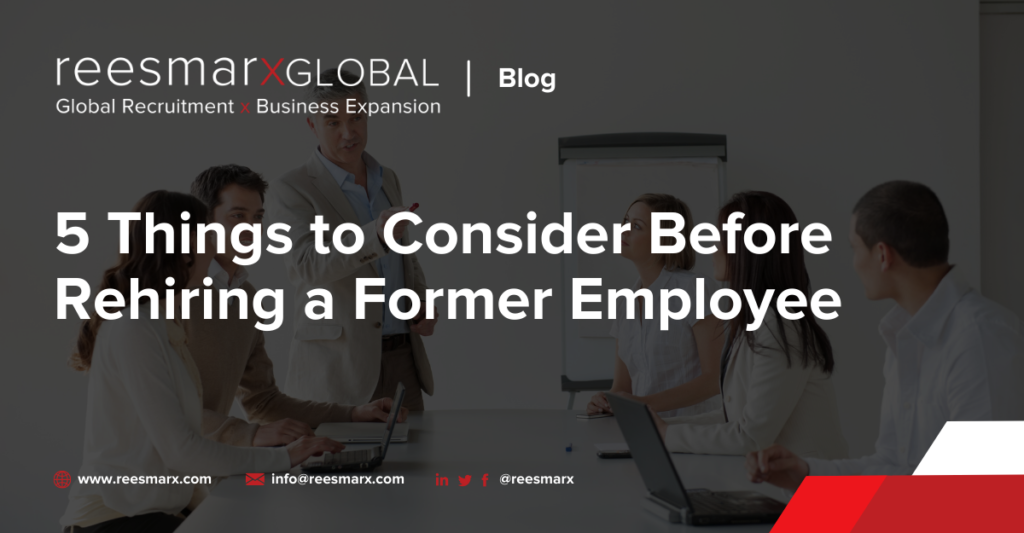When it comes to corporate careers, one of the most famous global business leaders Steve Jobs, is a frequent example of ‘breaking the rules’ and achieving success through unconventional means. Steve Jobs briefly left Apple even though he was the co-founder of the corporation, and then returned years later taking the business to international success through his leadership.
From government organizations that release and then rehire skilled employees, to major corporations around the world, employee mobility means that sometimes businesses must decide whether it is a risk or an advantage to rehire former employees.
Does your business have a policy regarding returning employees? Even if you do not have a formal policy it is recommended that you have a procedure in place to evaluate the employee based on criteria that help reduce hiring risks.
Supporting businesses with expert global recruiting services for over twenty years, reesmarx has experience with former employees that contact recruiters, with the intention to rejoin their former organization. Our clients often ask: “Is it a good idea to hire a former employee?” and our answer is to lead them through this five-step evaluation, to determine whether the individual is an asset or a potential liability for rehire.
The Five Step Evaluation for Potential Rehires
Here is the process our recruiters use to determine whether a former employee should be considered, after they have expressed interest in rejoining the organization.
1. What Were the Reasons Behind the Employee Departure?
Exit interviews are a valuable tool to help HR and managers identify conflicts. But they are also invaluable when a former talented employee expresses their interest in rejoining the organization. It may have been years since they worked for your business, however the exit interview will provide a refreshed insight into why they left in the first place.
In our contemporary global environment, employees that are strategic about their advancement, may explore other opportunities. This is not a bad thing, but rather indicates motivation, the desire to continue professional development and most talented professionals have a higher than average labor motility rate. They have highly sought after and competitive skills and are open to exploring new advancement opportunities.
These are positive attributes indicative of a talented employee. Did they move to another organization because there were no advancement opportunities currently available for them? If they return, is there the potential and resource to coach them into an advanced role?
Sometimes the reason a talented employee leaves (and then requests to return) is because of an interpersonal conflict with a manager or colleague. Did they identify a conflict in their exit interview?
It is not uncommon for quality employees to leave when they are intimidated or bullied by a co-worker or manager, and then return when they learn that the individual is no longer with the organization. If a toxic employee was the reason for leaving (and has left) you can understand why your former staff member would like to return. The problem was an individual; not your organization.
2. How Did the Employee Conduct Themselves After Tendering Notice?
This consideration may require review of the human resource employee file for the former employee. What behaviors did you notice after the employee tendered their resignation notice?
Were they diligent and helpful, providing assistance to organize their data, responsibilities and resources and / or train another employee in their duties? Did they conduct their final workdays with integrity, or did you see negative work attitudes and behaviors?
Someone who truly cares about the organization they worked with would end their tenure on a positive note. Someone without that commitment to the organization, or care for their department and colleagues, would demonstrate ambivalence. This attitude and their actions should weigh heavily in your decision process.
3. What Experience Did the Employee Gain After Leaving Your Organization?
Ask your former employer to elaborate on what they learned, when they left your organization. If they were gone for a period of a year or longer, allow them to explain what new experiences they had and professional skills they developed.
First, acknowledge that diversified experience is definitely a competitive asset to your organization. Do they have new certifications? Did they engage in continuing education or new on-the-job training?
If your employee has a negative story to tell about their job experience after they left the organization, consider that a red flag. Are they attempting to return to your organization because it is ‘safe and comfortable’ while they search for a new career opportunity? Reduce your rehiring risk by building a profile of your former employer and their performance, success and intentions.
4. How Does the Department Feel About Rehiring the Former Employee?
Consider that employees are often very hesitant to be honest about the performance, personality, work habits and overall demeanor of a colleague, while they are still working with them. We know why this aversion to whistleblowing exists; no one wants to be the bad guy, or the employee who is seen as complaining about their colleagues.
This protectionist behavior however changes, after the employee has left the organization. You will find that if you interview former colleagues within the department, your team may be more willing now to directly and honestly share their true feelings and observations about the individual.
Why is this step important? Because you may have employed an individual who had a toxic impact on the performance of your team. Intimidation can be a big factor that prohibits colleagues from being honest about the individual.
Before you rehire a former employee, have a group meeting with the team that will be working with them directly. Assure them that their feedback is pivotal to your decision to rehire the former employee and listen closely to what your team has to say.
5. Are They Willing to Agree to an Extended Probationary Period?
Is it a good idea for organizations to impose a longer than normal probationary period, for an employee who is returning to work? That is up to the discretion of the human resource manager, but in our experience, it is a common practice for businesses to impose, and a benefit to help reduce risk factors.
Three months is a common and standard probationary period for new hires. But a rehire can either be a low or high-risk venture. Our recommendation is to include a mandatory six-month probationary period. They left the organization before, and as such they are at a higher than normal risk of leaving it again.
An increased probationary period will help save your business time and money, if the employee returns and promotes conflict or demonstrates low commitment and poor work performance.






